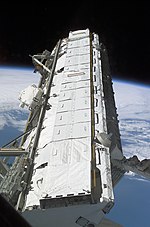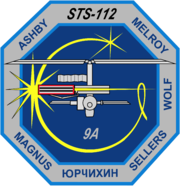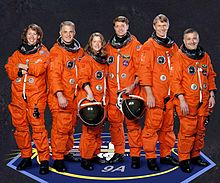
Back STS-112 Arabic STS-112 Bulgarian STS-112 Catalan STS-112 Czech STS-112 Danish STS-112 German STS-112 Greek STS-112 Spanish STS-112 Estonian استیاس-۱۱۲ Persian
 Canadarm2 takes the S1 truss out of the payload bay of Atlantis, prior to its installation on the ISS | |
| Names | Space Transportation System-112 |
|---|---|
| Mission type | ISS assembly |
| Operator | NASA |
| COSPAR ID | 2002-047A |
| SATCAT no. | 27537 |
| Mission duration | 10 days, 19 hours, 58 minutes, 44 seconds |
| Distance travelled | 7,200,000 kilometres (4,500,000 mi) |
| Orbits completed | 170 |
| Spacecraft properties | |
| Spacecraft | Space Shuttle Atlantis |
| Launch mass | 116,538 kilograms (256,922 lb) |
| Landing mass | 91,390 kilograms (201,480 lb) |
| Payload mass | 12,572 kilograms (27,717 lb) |
| Crew | |
| Crew size | 6 |
| Members | |
| Start of mission | |
| Launch date | 7 October 2002, 19:45:51 UTC |
| Launch site | Kennedy, LC-39B |
| End of mission | |
| Landing date | 18 October 2002, 15:44:35 UTC |
| Landing site | Kennedy, SLF Runway 33 |
| Orbital parameters | |
| Reference system | Geocentric |
| Regime | Low Earth |
| Perigee altitude | 273 kilometres (170 mi) |
| Apogee altitude | 405 kilometres (252 mi) |
| Inclination | 51.6 degrees |
| Period | 91.2 minutes |
| Docking with ISS | |
| Docking port | PMA-2 (Destiny forward) |
| Docking date | 9 October 2002, 15:16 UTC |
| Undocking date | 16 October 2002, 13:13 UTC |
| Time docked | 6 days, 21 hours, 57 minutes |

 (L-R): Sandra H. Magnus, David A. Wolf, Pamela A. Melroy, Jeffrey S. Ashby, Piers J. Sellers and Fyodor Yurchikhin | |
STS-112 (ISS assembly flight 9A) was an 11-day Space Shuttle mission to the International Space Station (ISS) flown by Space Shuttle Atlantis.[1] Space Shuttle Atlantis was launched on 7 October 2002 at 19:45 UTC from the Kennedy Space Center's launch pad 39B to deliver the 28,000 pound Starboard 1 (S1) truss segment to the Space Station.[2] Ending a 4.5-million-mile journey, Atlantis landed at 15:44 UTC on 18 October 2002 on runway 33 at the Kennedy Space Center's Shuttle Landing Facility.
During the launch, the ET bipod ramp shed a chunk of foam that caused a dent ~4" wide and 3" deep into the metal SRB-ET Attach Ring near the bottom of the left Space Shuttle Solid Rocket Booster.[3] Prior to the next mission (STS-113), an upper-level decision was made at NASA to continue with launches as scheduled. The launch subsequent to that was the Space Shuttle Columbia disaster, the ill-fated STS-107.[4]
Space Shuttle Atlantis had been scheduled to visit the International Space Station (ISS) again on the STS-114 mission in March 2003;[5] however, due to the loss of Columbia, all Space Shuttles, including Atlantis, were temporarily grounded. Due to rescheduling of missions, Atlantis did not fly again until STS-115 on 9 September 2006.
- ^ NASA (5 September 2002). "STS-112/9A Shuttle Press Kit – Expanding the Station Backbone/Increasing Crew Capabilities". Space.com. Archived from the original on 2 July 2010. Retrieved 12 August 2010.
- ^ "STS-112 MCC Status Report #01". NASA. 8 October 2002. Archived from the original on 17 October 2002. Retrieved 12 August 2010.
- ^ Oliu, Armando (10 October 2002). "STS-112 SRB POST FLIGHT/RETRIEVAL ASSESSMENT" (PDF). Archived from the original (PDF) on 19 July 2012. Retrieved 6 August 2011.
- ^ Gehman, Harold; Barry, John; Deal, Duane; Hallock, James; Hess, Kenneth; Hubbard, G. Scott; Logsdon, John; Osheroff, Douglas D.; Ride, Sally; Tetrault, Roger; Turcotte, Stephen; Wallace, Steven; Widnall, Sheila (26 August 2003). Report of Columbia Accident Investigation Board (PDF) (Report). Vol. 1. NASA. pp. 125, 148, 149. Archived (PDF) from the original on 5 May 2021. Retrieved 15 August 2022.
- ^ NASA (18 October 2002). "STS-112 MCC Status Report #23". Archived from the original on 20 October 2002. Retrieved 12 August 2010.